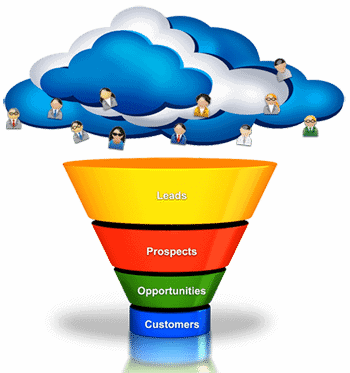
Growing businesses face unique problems. One of their issues is to manage the ever-increasing number of leads. All entrepreneurs and business owners understand that when leads are not given equal attention, they tend to lose interest and shift to the competitors within the market.
According to B2B Technology Marketing Community, 61% of B2B marketers think generating high-quality leads is one of their biggest challenges.
This is exactly where lead management comes into play.
It is therefore required to efficiently manage leads, which is best done with the help of lead management software.

What is a lead management process?
The lead management process does not just involve managing leads. It also involves capturing leads and tracking their activities and behavior. It also involves attending to them and making them ready for sales, and then passing them to the sales team.
Lead Management Software
Lead management software helps merge sales processes and assignments. It collects important sales information in minutes instead of doing it manually in hours. It lets you analyze important data like conversion rates and also gives an insight into your sales team’s performance. Besides, it keeps a tab on your sales lifecycle to help you quickly meet your goals.
Who uses lead management software?
Lead management software helps to both B2B and B2C companies target audiences and nurture leads. Each, however, has its software and lead requirements.
According to B2B Technology Marketing Community, increasing quality leads is the top priority for 68% of B2B professionals, followed by increasing lead volume (at 55%.)
In the case of B2B companies, they target lead generation and longer sales interaction lifecycles. As per Content Marketing Institute, 85% of B2B marketers say lead generation is their most important content marketing goal in 2016.
The figures say it all!
This is done through strong lead scoring and nurturing features that help develop their relationship with the leads.
In the case of B2C companies, the sales team sells directly to customers. So they need lead tracking features to organize so many consumers’ data. They may also need software with analytics features that help identify different customer segments.
Types of lead management software
There are various types of lead management software based on their features, costs, and programs. They are:
- On-premises systems are the most expensive ones with complex setup and some hardware installation. A single license covers it, and it is hosted on the client’s local server.
- Software-as-a-service (SaaS) systems are usually paid every month and hosted on the vendor’s server. The business owner isn’t responsible for its installation, maintenance, and updates.
- Cloud-hosted versions are usually free basic plans offering universal access where the client doesn’t do updates or pay for maintenance.
Key features of a lead management software
Following are some of the important features common to all lead management software are:
1. Automatic lead storage and distribution
This is where the software handles the leads collected through various channels and stores them in a database. The leads are later evaluated and distributed to the right sales rep. It helps keep track of marketing strategies so that you can stop investing in strategies that don’t give any results.
2. Lead analysis
This involves identifying promising leads through variables like online behavior, demographics and job title to learn about the lead’s background and buying behavior.
3. Lead nurturing tools
These tools automatically follow up leads and deliver relevant content to them. This helps build a relationship with the lead and makes them ready to buy from you.

As per a report by Hubspot, “Expertise in lead nurturing results in a 50% increase in sales-ready leads, along with a 33% decrease in its cost”
4. Lead analytics
The software here helps create and analyze lead reports with an overview of sales and marketing results. It helps ascertain the converting leads and successful sales campaigns.
5. Security
Security is always important because you can’t afford to lose your business data and customer information. For example, not all sales reps should be able to view or leak leads. They should be able to see only those leads assigned to their region or area of responsibility.
What does lead management software do?
Here’s how the automated process works:
Lead generation
This is the first part involving advertising through various sources like social media and emails to acquire leads. There’s nothing that can be done if there are no leads for the software to manage!
Lead capture automation
With so many sources providing so many leads, it’s not practical to manually enter each lead into the system. The software automatically feeds each lead into the system at the point of origin to prevent its leakage.
You can also automatically assess the sources generating most, and least leads and revenue. This helps plan your next marketing strategy.
Lead tracking
The software here tracks the lead’s activities and behavior through pages they visit and forms filled. Some even track phone or chat conversations to provide important lead information.
Lead qualification
This is where the software ascertains if the leads are worth pursuing or not. This is based on various criteria like chances of closure which helps the sales team prioritize and reach out to these leads first.
Lead distribution
The software here auto-assigns leads to the relevant sales people based on perhaps location or the product they are interested in. The right salespeople can start reaching out to them to reduce the response time and quicken possible sales.
Lead nurturing
Some leads may not buy at the moment, but this doesn’t mean they are dead. They may change their minds later on and just need time. These leads, unfortunately, constitute the largest portion of your leads.
They end up in the lead nurturing cycle. This is where you consistently interact with them through various channels like emails or social media. The most common form of interaction is sharing content they will most probably be interested in. It’s when they seem interested and ready to be sold to that the leads are handed over to the sales team.
Did you know that “22% of B2B businesses reach out to prospects with lead nurturing on a weekly basis” as per a study conducted by Strategic-ic.
Choosing the best lead management software
With so many types of software available, you need to know the important features to buy the best.
Ease-of-use
This is the most important. The software should be easy for any salesperson to understand and use. Remember, no matter which software you have, it’s the salespeople who are important for successful sales. A good software helps them close deals.
Pipeline focus
The software has to focus on pipeline management. The following figure shows the lead’s journey from a qualified prospect to a converted customer. The salesperson should be able to see a clear route in the pipeline directing them on their next step like making calls.

Flexible integration of tools
It’s not enough to just have the best lead generation software. There are so many other tools that are equally important to a sales team. Management and representatives should be able to easily integrate and use tools like accounting software or Google apps with the software.
Simplify team management
Managers need to manage their team and keep a tab on the entire sales set up for efficient and good team collaboration. They need constant access to vital data, watch the activity feed and be able to comment when necessary.
The manager should be able to do things like step in and fix things if a lead seems to be slipping from their fingers. In short, the software should be designed to give the manager a positive oversight over the entire experience. It should let them easily control the required processes to achieve all this.
Differentiates between cold and qualified leads
A good software should be able to recognize cold and qualified leads. This gives better results and saves time otherwise spent sifting through all the leads. One team can thus be assigned to focus on making cold calls to the unqualified leads, while another closes deals.
Mobile access
The salesforce should have mobile access to the system and pipeline while on the field through an app. It is even better if the app has additional features like scanning business cards.
Benefits of lead management software
Here is a list of benefits that you get when using an automated system:
-
Better prioritization of leads
As per a report by Marketing Sherpa, 79% of marketing leads never convert into sales and only 56% of B2B companies check valid leads before passing them to the sales dept.
The system’s lead scoring and nurturing features help sales teams focus on only the promising leads. It helps them to quickly and efficiently convert leads.
-
Streamlining
With the system automating the captured lead lifecycle, there is no chance of overlooking leads. This in turn saves time and boosts the chances of closing deals.
-
Efficient and quicker sales rep services
Sales operation is a time-consuming process. The best way to maximize your sales team’s efforts is by directing them to only the good leads. This is where automation helps. It filters out the non-promising leads by understanding the promising leads’ buying pattern.
-
Help make smarter and cost-effective business decisions
Lead management software can also save your marketing costs and time. Instead of using too much content for lead generation, the software directs the most effective content attracting qualified leads. You can accordingly invest time and money in creating only content and marketing strategies that attract leads.
Top 3 Questions to ask while choosing lead management software

1. What is my budget?
You have to compare upfront and ongoing costs to determine your budget. While you may be tempted to choose a free application, they usually have limited features and access.
Systems with more features are more expensive. The payment processes for different systems are also different. Cloud lead management software has a monthly or annual subscription cost while on-premises software has a one-time license fee.
2. How user-friendly or automated is the software?
You may get tempted to customize your software to your business needs. However, remember that things can get complicated if there’s no balance between your customized features and easy-to-use UX navigation. Look for simply designed software with a balanced system that your staff will be able to use and navigate.
3. Is it better to work on-premise or on the cloud?
The choice depends on price and customization. Besides, companies with fewer specialized needs do well with cloud-based systems. However, those requiring better control over their software are better off with on-premises options.
Cloud-based options are cheaper upfront but converge with additional expenses later on. You, however, don’t have any additional hardware investments to make.
Besides, data security responsibility lies in the vendor’s hands. Though it’s less-customizable, it lets you work with the vendors for added stability. Besides, they need less time for implementation.
On-premise software, however, is more expensive upfront but doesn’t have many expenses done the line. While you are responsible for the data’s security, you have more customization options. This means you have more control over the implementation process.
Conclusion
Everything bubbles down to one thing. Lead management software is helpful, and a must a growing organization. The automated systems are better streamlined to improve efficiency and thereby save your time and efforts.




